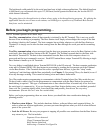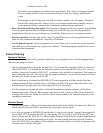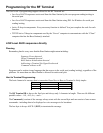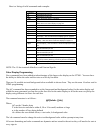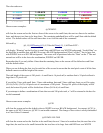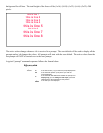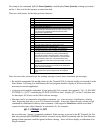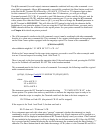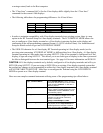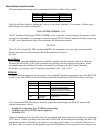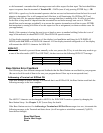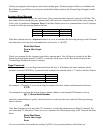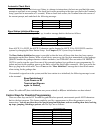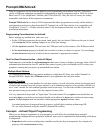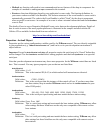
a carriage return) back to the Host computer.
• The “Clear lines” command (@Cx) for the 4 line displays differ slightly from the “Clear lines”
command for the current 6 line displays.
• The following table shows the programming differences for 4 lines/6 lines:
Command 4 Line 6 Line 15 Line
@C0 Clears all lines Clears all lines Clears all lines
@C5 Clears all lines Clears line 5 Clears line 5
@C6 No effect Clears line 6 Clears line 6
@CA No effect No effect Clears line 10
• In order to maintain compatibility with 4 line display terminals in an existing system, there is a new
option in the RF Terminal Setup for 6 line display terminals. The LCD DISPLAY MODE allows the
user to configure a 6 line display terminal as a 4 line display (centering the data on the display and
conforming to the old programming command format, i.e. @C05 clears all lines). See Installation and
Setup for details on how to get into LCD DISPLAY MODE.
• The SIGN ON character for a 6 line display RF Terminal operating in 6 line display mode (see the
previous point concerning LCD DISPLAY MODE) is different than for a 4 line display. A 6 line display
terminal operating in 6 line mode signs on using ASCII 22. If the 6 line terminal is configured for 4 line
display, it signs on using ASCII 15. This allows you to use both types of display in the same system and
be able to distinguish between the two terminal types. See page 6-6 for more information on SIGN ON.
CAUTION: All 6 line display terminals are by default, configured as 6 line display terminals and will try to
SIGN ON using ASCII 22. If you are trying to SIGN ON to an existing 4 line display terminal system that
has not had any changes in its programming to utilize the 6 line display terminals, the 6 line display terminal
will NOT BE ABLE TO SIGN ON. Make sure to reconfigure the Terminal using the LCD DISPLAY
MODE to operate as a 4 line display terminal.
Here are some sample command statements utilizing some of the programming tips offered above:
@2,1,1,ENTER ITEM NO Display ENTER ITEM NO on line 2, position 1
and wait for wait for data input. This is a valid
single command statement – it ends with a
data entry request.
@V23@1,2,1,WRONG ITEM Play voice message 23, display WRONG ITEM
on line1, position 2 and wait for data input. This is
a valid multiple command statement – it ends
with a data entry request.
@C1@1,7,0,PICKING Clear line 1. Display PICKING at position 7 of
line 1. This statement is illegal. To be a valid
statement, it must end with a data entry
request. For example:
@C1@1,7,0,PICKING@2,7,1,ITEM
@1,1,1,ITEM@2,1,1,QTY Since only one command can be a “prompt” data
entry request, this is an illegal statement and
would be ignored as a command. It would be
valid if changed to @1,1,0,ITEM@2,1,1,QTY



